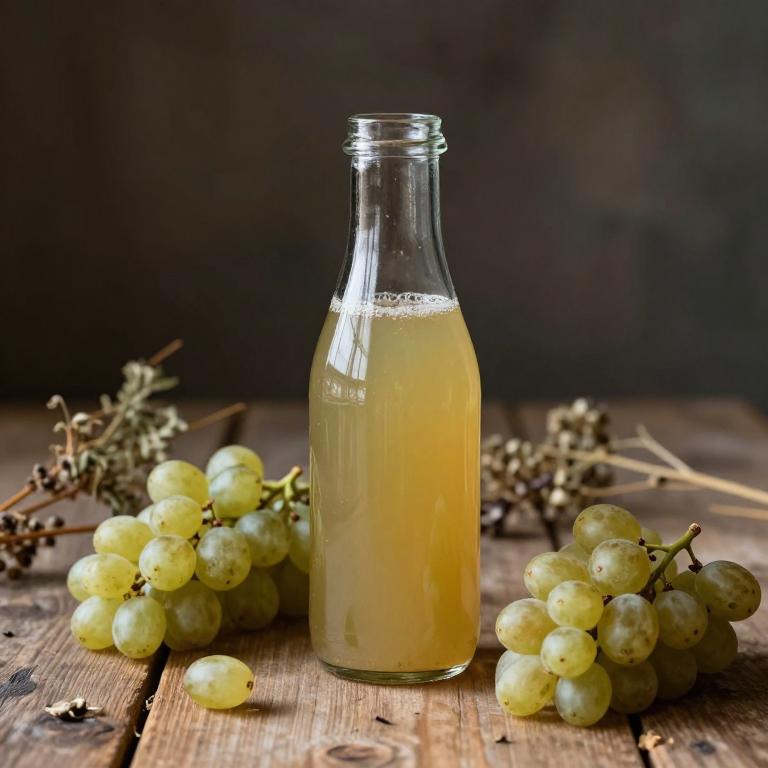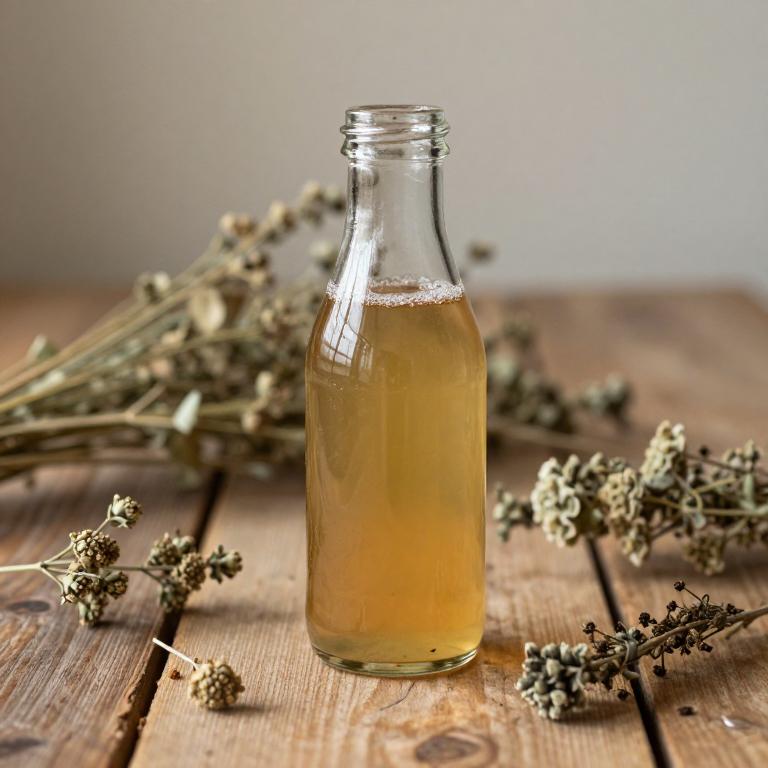10 Best Herbal Juices For Gout

Herbal juices have gained popularity as a natural alternative for managing gout, a condition characterized by high uric acid levels and painful joint inflammation.
Certain herbs, such as nettle, parsley, and dandelion, are believed to support kidney function and help flush out uric acid from the body. These juices can be incorporated into a daily diet to complement medical treatments and reduce the risk of gout flare-ups. However, it is important to consult with a healthcare professional before using herbal juices, as some may interact with medications or have side effects.
Overall, while herbal juices may offer some benefits, they should not replace conventional treatments for gout.
Table of Contents
- 1. Stinging nettle (Urtica dioica)
- 2. Turmeric (Curcuma longa)
- 3. Blessed thistle (Cnicus benedictus)
- 4. Thistle (Silybum marianum)
- 5. Licorice (Glycyrrhiza glabra)
- 6. Common grape (Vitis vinifera)
- 7. Ginger (Zingiber officinale)
- 8. Field horsetail (Equisetum arvense)
- 9. Dog rose (Rosa canina)
- 10. Aloe vera (Aloe barbadensis)
1. Stinging nettle (Urtica dioica)

Urtica dioica, commonly known as stinging nettle, has been traditionally used in herbal medicine for its potential health benefits, including its role in managing gout.
The plant contains compounds like silica, potassium, and antioxidants that may help reduce uric acid levels in the body, which is a key factor in gout development. Herbal juices made from fresh or dried stinging nettle leaves are often consumed to support kidney function and promote the excretion of uric acid. However, it is important to consult with a healthcare professional before using stinging nettle juice, as it may interact with certain medications or have side effects for some individuals.
Despite its natural appeal, urtica dioica should not be seen as a substitute for conventional medical treatments for gout.
2. Turmeric (Curcuma longa)

Curcuma longa, commonly known as turmeric, contains curcumin, a compound renowned for its anti-inflammatory and antioxidant properties.
Herbal juices made from turmeric are often used to support joint health and reduce inflammation, which can be beneficial for individuals suffering from gout. These juices may help alleviate pain and swelling associated with gout by inhibiting inflammatory pathways in the body. However, while some studies suggest potential benefits, more research is needed to confirm their effectiveness in treating gout specifically.
It is advisable to consult a healthcare professional before incorporating turmeric juice into a gout management plan.
3. Blessed thistle (Cnicus benedictus)

Cnicus benedictus, commonly known as St. Benedict's thistle, has been traditionally used in herbal medicine for its potential benefits in managing gout.
This plant contains compounds such as sesquiterpene lactones and flavonoids, which may help reduce inflammation and pain associated with gouty arthritis. Herbal juices made from Cnicus benedictus are believed to support kidney function, aiding in the removal of uric acid crystals from the body. However, it is important to consult a healthcare professional before using these juices, as they may interact with medications or have side effects.
While some anecdotal evidence supports its use, more scientific research is needed to fully understand its efficacy and safety for gout treatment.
4. Thistle (Silybum marianum)

Silybum marianum, commonly known as milk thistle, is a herbal plant that has been traditionally used for its liver-protecting properties.
While it is not a primary treatment for gout, some studies suggest that its anti-inflammatory and antioxidant compounds may help reduce uric acid levels and inflammation associated with gout. Herbal juices made from silybum marianum are often marketed as natural supplements to support overall joint and liver health. However, it is important to consult a healthcare professional before using these juices, as they may interact with medications or not be effective for everyone.
Despite its potential benefits, more clinical research is needed to confirm its efficacy in managing gout symptoms.
5. Licorice (Glycyrrhiza glabra)

Glycyrrhiza glabra, commonly known as licorice root, has been traditionally used in herbal medicine for its anti-inflammatory and analgesic properties.
Some studies suggest that the compounds in licorice root, such as glycyrrhizin, may help reduce uric acid levels in the blood, which is a key factor in the development of gout. However, it is important to note that excessive consumption of licorice root can lead to side effects like hypertension and fluid retention due to its effect on the adrenal glands. While some people use licorice root juice as a natural remedy for gout symptoms, it should not replace prescribed medical treatments without consulting a healthcare professional.
Always ensure that any herbal remedy is used in moderation and under the guidance of a qualified practitioner.
6. Common grape (Vitis vinifera)

Vitis vinifera, commonly known as the grape vine, has been traditionally used in herbal medicine for its potential health benefits, including its role in managing gout.
The berries and leaves of Vitis vinifera contain compounds like resveratrol, which may help reduce inflammation and oxidative stress, both of which are linked to gout flare-ups. Herbal juices made from Vitis vinifera are believed to support kidney function, aiding in the elimination of uric acid, a key contributor to gout. While some studies suggest that grape-based products may offer modest relief, more research is needed to confirm their efficacy as a standalone treatment for gout.
As with any herbal remedy, it is important to consult a healthcare professional before incorporating Vitis vinifera juices into a gout management plan.
7. Ginger (Zingiber officinale)

Zingiber officinale, commonly known as ginger, has been traditionally used for its anti-inflammatory and pain-relieving properties, making it a popular choice for managing gout symptoms.
Ginger contains bioactive compounds like gingerol and shogaol, which help reduce inflammation and oxidative stress, both of which are linked to gout flare-ups. Incorporating ginger into herbal juices can provide a natural and soothing way to support joint health and alleviate the discomfort associated with gout. However, while ginger may offer some relief, it should not replace prescribed medical treatments for gout.
It is advisable to consult a healthcare professional before using ginger or any herbal remedy as part of a gout management plan.
8. Field horsetail (Equisetum arvense)

Equisetum arvense, commonly known as field horsetail, has been traditionally used in herbal medicine for its high concentration of silica and other bioactive compounds.
Some studies suggest that the silica in horsetail may help reduce uric acid levels in the body, which is a key factor in the development of gout. However, while there is anecdotal evidence supporting its use, scientific research on its effectiveness for gout remains limited and inconclusive. Herbal juices made from Equisetum arvense are often consumed as part of a holistic approach to managing gout symptoms, though they should not replace conventional medical treatments.
It is important to consult with a healthcare professional before using horsetail or any herbal remedy, especially for individuals with existing health conditions or those taking medications.
9. Dog rose (Rosa canina)

Rosa canina, also known as rosehip, is a traditional herbal remedy that has been used for centuries to support joint health and reduce inflammation.
The juice extracted from its fruits is rich in antioxidants, vitamins C and E, and essential fatty acids, making it a valuable natural supplement for individuals suffering from gout. Its anti-inflammatory properties may help alleviate the pain and swelling associated with gout attacks by reducing uric acid levels in the body. Studies suggest that regular consumption of rosehip juice can improve joint mobility and decrease the frequency of gout flare-ups.
However, it is important to consult with a healthcare professional before incorporating rosa canina juice into a gout management plan, as it may interact with certain medications or conditions.
10. Aloe vera (Aloe barbadensis)

Aloe barbadensis, commonly known as aloe vera, has been traditionally used for its soothing and healing properties, and some studies suggest it may offer benefits for individuals suffering from gout.
The gel extracted from the aloe plant contains anti-inflammatory compounds that may help reduce inflammation and pain associated with gout attacks. While there is limited scientific evidence directly linking aloe vera juice to gout management, its potential to support overall joint health and detoxification is often cited in alternative medicine circles. Some people consume aloe vera juice as part of a holistic approach to managing gout symptoms, though it is important to consult a healthcare provider before incorporating it into a treatment plan.
As with any herbal remedy, the effectiveness of aloe barbadensis juice for gout can vary, and it should not replace conventional medical treatments.